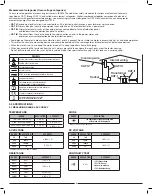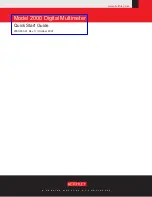
RANGE
RESOLUTION
ACCURACY
400
Ω
0.1
Ω
(1.5% + 2)
4K
Ω
1
Ω
(1.0% + 2)
40k
Ω
10
Ω
400k
Ω
100k
Ω
4M
Ω
1k
Ω
± (1.2% + 5)
20M
Ω
10k
Ω
± (2% + 5)
RESISTANCE
3
Incoming wire
Interior wiring
CAT. III
Transformer CAT. II
CAT. I
CAT. IV
Socket
Symbols
Caution, risk of danger, refer to the operating manual before use
Caution, risk of electric shock
AC (Alternating Current)
DC (Direct current)
AC/DC Selectable (Alternating Current/Direct Current)
Earth (ground) Terminal
The equipment is protected throughout by
double insulation or reinforced insulation
Application around and removal from hazardous
live conductors is permitted.
Conforms to Standards of European Union
Designates the product as recyclable
electronic waste per WEEE Directive
Measurement categories (Over-voltage categories)
To ensure safe operation of measuring instruments, IEC61010 establishes safety standards for various electrical environments,
specified as CAT I through CAT IV, and called measurement categories. Higher-numbered categories correspond to electrical
environments with greater momentary energy, so a measuring instrument designed for CAT III environments can endure greater
momentary energy than one designed for CAT II.
• CAT I: Secondary electrical circuits connected to an AC electrical outlet through a transformer or similar device.
• CAT II: Primary electrical circuits of equipment connected to an AC electrical outlet by a power cord.
• CAT III: Primary electrical circuits of the equipment connected directly to the distribution panel,
and feeders from the distribution panel to outlets.
• CAT IV: The circuit from the service drop to the service entrance, and to the power meter and
primary over current protection device (distribution panel).
• Avoid placing the meter in areas where vibration, dust or dirt is present. Do not store the meter in excessively hot, humid or damp places.
• This meter is a sensitive measuring device and should be treated with the same regard as other electrical and electronic devices.
• When the meter is not in use keep the meter turned off to keep the battery from discharging.
• When disconnecting the test leads from the unit, always grasp the leads where the input jacks meet the tester housing.
Do not pull the leads out of the jacks by the insulated wire or transport the tester using the test leads as a carrying strap.
3.0 SPECIFICATIONS
3.1 MEASURING RANGE & ACCURACY
RANGE
RESOLUTION
ACCURACY
-40 - 104˚F (-40 - 40°C)
1˚F (1°C)
±5˚F
>104 - 932˚F (40 - 500°C)
1˚F (1°C)
± (1.5% + 5)
>932 - 1832˚F (500 - 1000°C)
1˚F (1°C)
±(2.5% + 5)
TEMPERATURE
RANGE
RESOLUTION
ACCURACY
4V
1mV
± (0.8% + 5)
40V
10mV
400V
100mV
(1.5% + 5)
600V
1V
- Frequency Response: 40Hz - 400Hz
AC VOLTAGE
RANGE
RESOLUTION
ACCURACY
4V
1mV
(0.5% + 3)
40V
10mV
400V
100mV
(0.8% + 3)
600V
1V
DC VOLTAGE
RANGE
RESOLUTION
A
A
400A
400A
The approximate forward voltage drop
of the diode will be displayed
- Open-circuit voltage: about 2V
DIODE
RANGE
RESOLUTION
ACCURACY
0.1
Ω
≤
10
Ω
Buzzer beep
10
Ω
-70
Ω
Buzzer
may or may not beep
≥
70
Ω
No buzzer beep
CONTINUITY TEST
























